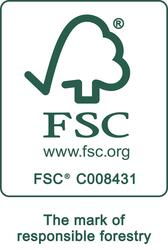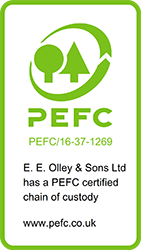Environmental Data
FSC & PEFC – What do these certifications mean? 

EE Olley are registered with both schemes to ensure ours customers are able to source timber products from legal & sustainable sources. Click HERE for certificates.
FSC
Forest Stewardship Council®
- FSC is a global, not-for-profit organization dedicated to the promotion of responsible forest management worldwide.
- It enables businesses and consumers to make informed choices about the forest products they buy, and create positive change by engaging the power of market dynamics.
Ten rules for responsible forest management
The ten FSC Principles require the forest owner or manager to do the following:
Principle 1:
Compliance with laws and FSC Principles – to comply with all laws, regulations, treaties, conventions and agreements, together with all FSC Principles and Criteria.
Principle 2:
Tenure and use rights and responsibilities – to define, document and legally establish long-term tenure and use rights.
Principle 3:
Indigenous peoples’ rights – to identify and uphold indigenous peoples’ rights of ownership and use of land and resources.
Principle 4:
Community relations and worker’s rights – to maintain or enhance forest workers’ and local communities’ social and economic well-being.
Principle 5:
Benefits from the forest – to maintain or enhance long term economic, social and environmental benefits from the forest.
Principle 6:
Environmental impact – to maintain or restore the ecosystem, its biodiversity, resources and landscapes.
Principle 7:
Management plan – to have a management plan, implemented, monitored and documented.
Principle 8:
Monitoring and assessment – to demonstrate progress towards management objectives.
Principle 9:
Maintenance of high conservation value forests – to maintain or enhance the attributes which define such forests.
Principle 10:
Plantations – to plan and manage plantations in accordance with FSC Principles and Criteria.
PEFC
Programme for the Endorsement of Forest Certification
- PEFC is the world’s largest forest certification organisation.
- PEFC is an international non-profit, non-governmental organisation dedicated to promoting Sustainable Forest Management (SFM) through independent third-party certification. PEFC works throughout the entire forest supply chain to promote good practice in the forest and to ensure that timber and non-timber forest products are produced with respect for the highest ecological, social and ethical standards. PEFC’s distinctive ‘green trees’ logo make it a truly global brand and means customers and consumers are able to identify products from sustainably managed forests.
Principles & Objectives
PEFC UK Ltd has adopted the definition of sustainable forest management (SFM) initially developed by Forest Europe in 1993 and subsequently adopted by the Food and Agriculture Organization (FAO) of the United Nations.
The organisation is committed to the following guiding principles:
Quality – through the stringency of criteria for technical and professional competencies with which to operate the Scheme.
Continuous Improvement – through response to new knowledge and changes in demands.
Consistency – with internationally recognised indicators and performance criteria of credible forest certification standards, schemes, and of the certification process itself.
Use and promotion of the UK Woodland Assurance Standard – as the criteria and indicators for verification of sustainable forest management in the UK.
Credibility – through third party, independent auditing carried out by certification bodies accredited by UKAS or other accreditation bodies operating to internationally accepted ISO standards and guidelines.
Transparency – of all stages of both the certification standard and the certification scheme
Accountability to, and participation with – the UK and wider forestry and timber using communities and stakeholders.
Cost effectiveness – through minimising the administrative and financial burden to the scheme’s customers.
Accessibility – via the UK Woodland Assurance Standard and the PEFC Council Chain of Custody Standard – to a range of certification options to all forest and wood using types, ownerships and structures.
United Kingdom Timber Regulation (UKTR)
What is the purpose of this regulation?
The UKTR came into force in January 2021. It bans illegal timber in the UK and required that companies that place wood or wood products on the UK market for the first time to assess the risk that those products may have come from an illegal source and act to mitigate any identified risk.
What does EE Olley & Sons do to ensure we meet these regulations?
As we purchase our products from within the EU we keep records of our due diligence on our suppliers most of which are certified to a chain of custody scheme.


